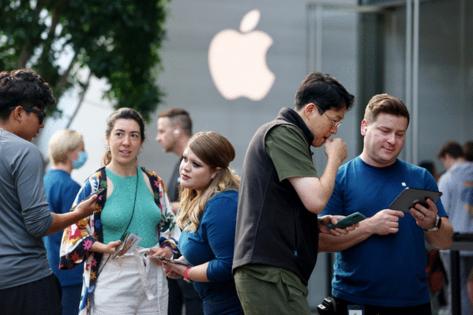What the DOJ's antitrust suit against Apple means for everyone with an iPhone
Published in Business News
Cheaper app subscriptions. Additional payment options. Greater freedom for app developers on the App Store. More consumer choice.
Those are some of the possibilities that consumer advocates hope will come to pass for users of Apple iPhones, iPads and other products if the U.S. Department of Justice wins its long-awaited antitrust lawsuit against the Cupertino, California, tech giant.
The lawsuit, filed Thursday, accuses Apple of stifling competition and leveraging its clout and ownership of the popular App Store to increase prices for customers. If the DOJ succeeds in its case, the implications for Apple's business could be significant — potentially changing the ways the company charges app developers and customers for products and services.
"This is a good thing for consumers because the Department of Justice is basically checking Apple's use of its market power to make sure it's not an abuse of its market power," said Jamie Court, president of L.A.-based nonprofit Consumer Watchdog.
For years, the Apple App Store has taken up to 30% of revenue from app subscriptions or in-app purchases from third-party developers. Developers have said this cut makes it difficult to keep their businesses viable, so they pass that charge on to consumers.
Unlike Google's Android operating system, which runs on Google phones as well as other devices such as Samsung's, Apple products operate only through its own software, iOS. The only way that third-party developers can get their app onto Apple's App Store is by following the iPhone maker's rules. If they don't, they risk losing out on millions of customers.
"This is signaling that Apple is going to have to bring its prices for other apps down," Court said. "It's going to have to open its payment systems to other providers and it's going to have to make sure that people who use other devices have basically a comparable access to convenience and service."
Some businesses, including Swedish audio company Spotify, have directed users to subscribe via their websites, avoiding the up to 30% cut. In 2020, Epic Games sued Apple after it got kicked out of the App Store when its game "Fortnite" was attempting to circumvent Apple's charge on in-app purchases. A U.S. District Court judge ruled in that case that Apple didn't maintain a monopoly in the market for mobile games, but ordered the company to allow developers to alert customers to different payment options.
Although many analysts expect Apple to change its practices somewhat as a result of the government's action, they do not expect any major immediate shifts. The most likely outcome is a settlement.
"We do not expect any business model changes for now, but Apple clearly is going to have to find a way to eventually settle this case, pay a hefty fine, and ultimately find some compromise with developers on the App Store structure down the road," said Daniel Ives, a managing director at Wedbush Securities, in a note to clients.
...continued
©2024 Los Angeles Times. Visit at latimes.com. Distributed by Tribune Content Agency, LLC.







Comments